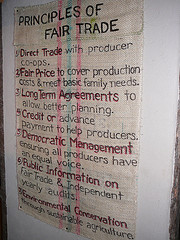Grandmother and former nurse Linda Sones sells organic cotton baby and children’s clothing and accessories, and natural, organic baby toiletries online at SonesUK. Her suppliers are all committed to various environmental and Fairtrade initiatives.
 Fairtrade is an organized social movement and market based model of International Trade (Wikipedia). In a capitalist society profits rule and the scramble of wealthy countries to make money often results in exploitation of small scale producers such as farmers, craft and textile workers etc. who are left to exist on minimum wages without any hope for their and their families’ future. At present the rules of global economics are made by institutions such as the World Trade Organisation, the World Bank and the International Monetary Fund. Global policies are developed with input mainly from multinational corporations and little input from the public.
Fairtrade is an organized social movement and market based model of International Trade (Wikipedia). In a capitalist society profits rule and the scramble of wealthy countries to make money often results in exploitation of small scale producers such as farmers, craft and textile workers etc. who are left to exist on minimum wages without any hope for their and their families’ future. At present the rules of global economics are made by institutions such as the World Trade Organisation, the World Bank and the International Monetary Fund. Global policies are developed with input mainly from multinational corporations and little input from the public.
Fairtrade works by paying producers a fair price for crops plus a little extra to help community development projects. It also helps to promote social and environmental standards. Price is agreed according to local or regional context, is reached via discussion with all parties and covers not only the cost of production but enables socially just and environmentally sound production. It pays fairly and without gender bias so that women are properly rewarded for their work. It is suggested that many more farmers could benefit from Fairtrade if it were not for unfair trade rules that make it very difficult for poor countries to trade their way out of the poverty trap. For example tariffs which are a type of import tax are levied by many countries. A tariff of 500 percent on rice for example makes it impossible for poor countries to trade with Japan. The European Union and United States of America give farmers massive subsidies. Resultant over production is then ‘dumped’ on poor countries making it difficult for farmers to even sell their crops within their own country.
Campaigns for trade justice aim to influence governments and International bodies to rewrite unjust trade rules. Rules need to be advantageous to people in poor countries rather than making it impossible for them to compete. Of course the Fairtrade movement does have its detractors. It has been suggested that it is a misguided attempt to make up for market failures encouraging inefficiencies and over production. This argument seems a little rich to me when you consider the European Union surfeits of crops which have been well documented in the press. Fairtrade supporters argue that current market prices do not reflect the true costs associated with production and that only a well managed and stable minimum price system is able to cover environmental and social production expenditure. Some left wing authors believe that Fairtrade does not go far enough. The French author and broadcaster Jean-Pierre Boris advocates immediate policy changes that would have a far bigger impact on disadvantaged producers lives. Author Christian Jacquiau suggests that Fairtrade should not seek to work within the flawed current structure but should establish a fairer and autonomous trading system. There are also concerns about the impact of Fairtrade on long term economic growth. However Fairtrade organisations contradict this argument claiming that Fairtrade is a market responsive model of trade and producers are encouraged to diversify and invest in speciality crop programmes.
In my opinion having read and considered the arguments put forward Fairtrade, although not perfect, is the best model we have at present to try to help poorer disadvantaged countries. Discussion and exchange of ideas is a healthy way forward to continue improving systems currently in place. With ethical and religious agencies such as Oxfam, Christian Aid and Amnesty International to name but a few involved in these discussions “Trade not Aid” may have real meaning for a better future.
Photograph by M.Gifford.